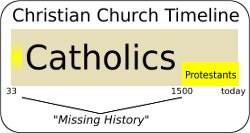
Growing-up in my Protestant church, I had a mix of religious education classes that were probably more-or-less typical of most denominations. Church history was not taught so much in the perspective of a continuous time-line but more as two chunks of time. The first chunk was the time of Our Lord and immediately thereafter, from 0 to around 100AD as detailed in the New Testament. The second chunk, told in some detail, was focused on the founding of our denomination around 1500AD to the present day.
That is only 600 years of church history. There is a huge gap in the middle that is missing of around 1400 years. This gap, if mentioned at all, was often to set ourselves apart from an allegedly failed Catholicism more than as part of our Protestant history. In hindsight, it was a necessary attempt at justification of our schism more than anything else.
The Catholic Church was certainly not perfect then nor is it today (other than rare infallible statements on faith and morals). No organization composed of fallen sinners can be, including every single Protestant denomination. Only the Catholic Church, from which the leaders of the reformation schism separated themselves, was instituted by Christ and given authority. That is, and always will be, unchanged.
Many in my Protestant church knew well the story and writings of our denomination’s founder, often better than we knew the early Church fathers and pre-reformation Saints (we did not claim any authority to canonize new saints). We accepted without serious question truth as from the Bible only, without dwelling on where and by what authority it came from or by what authority it was changed into our version after 1,500 years. For that matter, that Holy Scripture was changed (mostly by removals) to create a “Protestant Bible” was rarely mentioned, if at all. One great irony is that many Protestants who are aware of this think that the Catholic Church added books to Sacred Scripture and are indignant of the audacity to change it!
My homemade infographic represents the Catholic / Protestant time-line (for simplicity, I did not show the Orthodox Church). It is scaled from the founding of the Church in 33AD to the present. Protestantism appeared around 1500AD. The vertical height is also scaled to represent the current proportions.
The often downplayed point is that Protestant churches are in fact, breakaways from the Catholic Church. They did not appear out of nowhere! The Catholic Church appeared when Jesus created it. It was NOT created at the time of the Protestant schism. However, their Christian heritage and lineage is from the Catholic Church. That is a good thing as their true hope for salvation rests in that heritage. Until 1500AD, Protestants and Catholics were one Church as Jesus intended.
May the God of endurance and encouragement grant you to think in harmony with one another, in keeping with Christ Jesus, that with one accord you may with one voice glorify the God and Father of our Lord Jesus Christ. Welcome one another, then, as Christ welcomed you, for the glory of God.
While the very earliest disciples were known simply as Christians (Acts 11:26, the Church was also referred to as the Catholic Church (meaning universal Church) around the end of the first century (only 30-40 years after St. Paul was martyred). This was helpful to differentiate the true Church from some of the schismatic, heretical ones that began to appear. “Catholic” also appears (around 110 AD) in a farewell letter from early bishop St. Ignatius of Antioch before he was martyred.
See that you all follow the bishop, even as Jesus Christ does the Father, and the presbytery as you would the apostles; and reverence the deacons, as being the institution of God. Let no man do anything connected with the Church without the bishop. Let that be deemed a proper Eucharist, which is [administered] either by the bishop, or by one to whom he has entrusted it. Wherever the bishop shall appear, there let the multitude [of the people] also be; even as, wherever Jesus Christ is, there is the Catholic Church. It is not lawful without the bishop either to baptize or to celebrate a love-feast; but whatsoever he shall approve of, that is also pleasing to God, so that everything that is done may be secure and valid.
St. Ignatius of Antioch (110 AD)
letter to the Smyrnaeans, chapter 8
The mission of the Catholic Church was to spread the unchanging gospel of Jesus, administer the sacraments and exercise charity. That mission has remained the same for over 2,000 years. The Catholic Church of today teaches the same deposit of faith taught to us by Jesus. Our morality has not evolved. We plead guilty to being “old fashioned” and “behind the times!”
The Catholic Church gave us the Holy Bible by carefully discerning the canon over hundreds of years and many councils (Council of Rome, Council of Hippo, Council of Carthage, Ecumenical Council of Nicaea II, Council of Florence). Our Christian creed – the Nicene Creed – springs from another Catholic council (the First Ecumenical Council at Nicaea). The Catholic Church is led by popes in an unbroken line of succession beginning with St. Peter.
So where did this “reformation” movement come from? A Catholic priest and scholar named Martin Luther in the early 1500s. You know the story, but the net is that Luther ended-up creating a new, stripped-down version of the Catholic Church on his own. This was NOT his intention, but he and his followers got carried away with unfolding events. Others, inspired to do the same, subsequently created their own denominations different from Luther’s and from each other. By necessity, the new churches abandoned the authority that originated from Jesus and passed by Apostolic Succession. Also lost was Sacred Tradition (which gives us the cannon of Sacred Scripture), the Magisterium (which interprets it) and the Sacraments — all given to His Church by Christ Himself.
It is our hope that one day, the Church here on earth (the Church Militant) will once again be fully reunited. Until that time, we remain brothers and sisters in Christ, taking different paths to eternal life.
In my Father’s house there are many dwelling places. If there were not, would I have told you that I am going to prepare a place for you? And if I go and prepare a place for you, I will come back again and take you to myself, so that where I am you also may be. Where (I) am going you know the way.”



























Great graphic.
O imperador Constantino foi o verdadeiro fundador do catolicismo. Cristo fundou a Igreja primitiva.
(The Emperor Constantine was the real founder of Catholicism. Christ founded the early church.)
This myth always brings a smile to my face! It’s and oldie, but goody.
Christ founded 1 Church, around 33AD. Targeting that Church has always been priority #1 for Satan and the best way to do that is to divide it through heresy leading to schism. The deceiver has had some success. The full truth taught by our Lord has sadly been corrupted in modern times into thousands of conflicting versions by “protesting denominations.” We pray often for unity.
In the early Church around 100AD, heresies erupted in Christian communities just as they have today. Saying you were a “Christian” no longer necessarily meant that you shared the full beliefs of other Christians. A name was needed to differentiate the vast majority of Christians who remained in full communion with the universal Church. That name is “Catholic” (which means “universal”) and may have been used in 90AD or earlier. As noted above, St. Ignatius of Antioch expressly used this name in 110AD. Constantine was not even born for another 200 years.
The Church (known since 100AD as the Catholic Church) was created by Jesus. In this world of secularism, moral relativism and social injustice – this Church has remained for 2,000 years steadfast and unshakable from His teaching. Its organization remains unchanged from His design. Today’s bishops are direct successors in an unbroken chain from His Apostles. Pope Benedict XVI is the direct successor of St. Peter. This Church remains unchanged because it is not ours to change and it will survive against the gates of hell until the end of time as He has promised.
It is revisionist history my friend, to suggest Constantine created Christ’s Church. It is also revisionist history BTW, to believe that this or that Protestant ecclesial community is somehow the true Church when they were all created 1,500 years later by dissident men (Luther, Calvin, Wesley, Smyth, Henry VIII and countless others).